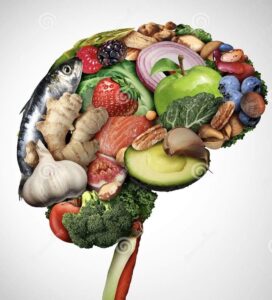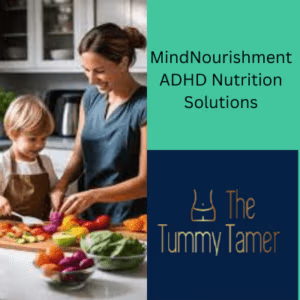If your ADHD teen struggles with fuzzy focus, mood swings, and meltdowns, you might not think to look at their digestion. However, research shows that gut health and brain function are closely linked. When digestion slows down, unfortunately it can make ADHD symptoms worse. Let’s explore the ADHD-Constipation Connection.
Moaning and complaining constantly about bloating and stomach pain is not just a random issue. Many parents and carers don’t realize that their child’s gut issues could be affecting their attention, mood, and even sleep.

For kids with ADHD, it’s a brain-gut issue. The same dopamine imbalances factors that affect attention and impulse control can also affect digestion. Chronic constipation can cause irritability, low energy, and poor focus, making ADHD management even harder.
In this post, we’ll explore why constipation is so common in kids with ADHD. Most importantly, some good news. Fixing digestion naturally can have a powerful effect on behaviour, emotional regulation, and brain function. By making simple changes to hydration, diet, and gut health, you can help your teen feel better, stay regular, and improve their focus and mood.
Table of Contents
- The ADHD-Gut Connection: Why Constipation is Common
- Signs That Constipation is Affecting Your Teen’s ADHD Symptoms
- The Hidden Causes: Why ADHD Kids Struggle with Regular Bowel Movements
- How to Fix It: Natural Ways to Improve Gut Health & Digestion
- Foods That Help vs. Foods That Harm
- When to Seek Professional Help
- Conclusion: The Power of Gut Health in ADHD Management
1. The ADHD-Gut Connection: Why Constipation is Common
When we think about ADHD, we often focus on the brain issues—poor attention, impulsivity, and hyperactivity. Let’s explore how the gut plays a major role in ADHD symptoms?
The gut and brain are connected by the gut-brain axis, a communication motorway between the digestive system and the nervous system. The gut produces neurotransmitters like dopamine and serotonin, which regulate mood, focus, and behaviour. In fact, about 90% of serotonin is produced in the gut! When digestion is sluggish, it can affect these brain chemicals, making ADHD symptoms worse.
How ADHD Affects Digestion
Teens with ADHD are more prone to constipation due to Slower gut motility – The digestive system moves food more slowly, leading to constipation.
Reasons for this include:
- Low fibre intake – Many ADHD kids prefer processed foods, which lack fibre needed for regular bowel movements.
- Dehydration – ADHD teens often forget to drink enough water, making stools harder to pass.
- Stress & anxiety – The ADHD brain is more prone to stress, which can slow digestion.
- Side effects of ADHD medication – Some stimulant medications can reduce appetite and slow down gut function.
Constipation isn’t just an inconvenience—it can affect mood, sleep, and even focus. If waste builds up in the intestines, toxins can re-enter the bloodstream, leading to brain fog, irritability, and low energy—all things that make ADHD harder to manage.
The good news? By improving gut health, you can help your teen feel better, regulate their emotions, and even improve their ability to focus. In the next section, we’ll cover the key signs that link constipation and teen’s ADHD symptoms.
2 Signs That Constipation is Affecting Your Teen’s ADHD Symptoms
Constipation isn’t just about struggling to go to the toilet—it can have a ripple effect on the brain and body. Could digestive issues be making your child’s or a child you care for ADHD symptoms worse? Here are some key signs that your teen’s gut health might be affecting their focus, mood, and behaviour.
Increased Irritability and Mood Swings
A constipated gut can lead to toxin buildup, which affects brain chemistry. This can make your teen more prone to irritability, emotional outbursts, and even anxiety. If your child is struggling with frequent meltdowns, their digestion could be playing a triggering role.
Brain Fog and Poor Concentration
When the gut isn’t functioning properly, nutrient absorption can suffer. Low fibre, dehydration, and sluggish digestion can contribute to brain fog, forgetfulness, and difficulty focusing—all common ADHD struggles. If your teen seems more scattered than usual, their digestion could be a hidden culprit in need of support.
Fatigue and Low Energy
Chronic constipation can make the body feel sluggish, uncomfortable and bloated. When waste builds up in the intestines, the body diverts energy to digestion, leaving your teen feeling tired, sluggish, or even unmotivated. Low energy levels can make usual ADHD symptoms like lack of motivation, procrastination, and difficulty starting tasks even worse.
Trouble Falling or Staying Asleep
Did you know that gut health directly affects sleep? The gut produces serotonin, a precursor to melatonin, the sleep hormone. When digestion is off, serotonin levels drop, making it harder to fall asleep or stay asleep. Poor sleep worsens ADHD symptoms, creating a cycle of inattention, hyperactivity, and poor emotional regulation.

Stomach Pain, Bloating, and Discomfort
Constipation can cause abdominal pain, bloating, and a constant feeling of fullness, which can be distracting and uncomfortable for a teen trying to focus at school. Many kids with ADHD may not recognize these symptoms as constipation, especially if they don’t express discomfort easily or have a high pain threshold.
Oppositional Defiance Behaviour or Emotional Sensitivity Dysphoria
When digestion is off, blood sugar levels and neurotransmitters can become unbalanced, increasing impulsivity, emotional reactivity, and defiance. If your teen is struggling with more meltdowns, frustration, or oppositional behaviour or+/ pathological demand avoidance then improving digestion could help regulate their mood.
What to Do Next
If any of these signs sound familiar, don’t worry—there are simple, natural solutions that can help improve digestion and, in turn, support ADHD symptoms. In the next section, we’ll explore why ADHD kids are more prone to constipation and the hidden factors that could be making it worse.
3 The Hidden Causes: Why ADHD Kids Struggle with Regular Bowel Movements
If your teen struggles with constipation, you might be wondering: is there a link with constipation and ADHD kids? There are several hidden factors that can make regular bowel movements a challenge. Let’s break down some of the key reasons why ADHD kids are more prone to digestive issues like constipation.
Low Fibre Intake
Many children and teenagers with ADHD gravitate toward processed foods that are low in fibre, such as chips, sugary snacks, and fast food. Fibre is essential for healthy digestion, as it helps bulk up stool and promotes regular bowel movements. Without enough fibre from fruits, vegetables, and whole grains, constipation can become a frequent problem.

Dehydration
Hydration is key for regular bowel movements, but kids with ADHD often forget to drink water throughout the day. The focus and energy required to manage ADHD symptoms can leave your teen feeling too distracted to prioritize hydration. Dehydrated stools are harder to pass, leading to constipation and discomfort.
Stress and Anxiety
Teens with ADHD often face heightened stress due to academic pressure, social struggles, and emotional regulation challenges. This stress can impact digestion, slowing down the movement of food through the intestines. Additionally, anxiety about school or social situations may trigger physical symptoms like constipation.
Medications for ADHD
While medications like stimulants are often used to treat ADHD, they can have side effects that slow down digestion. Stimulants (e.g., methylphenidate and amphetamines) can reduce appetite, leading to insufficient food intake and a lack of nutrients like fibre. They can also slow gut motility, making it harder for the digestive system to move food through the intestines.
Imbalance in Gut Bacteria
Emerging research shows that gut bacteria play a significant role in digestion and brain function. Kids with ADHD often have an imbalance in gut bacteria, which can lead to issues like constipation, bloating, and poor nutrient absorption. A lack of healthy bacteria can slow digestion and create digestive discomfort, making ADHD symptoms harder to manage.
Poor Eating Habits
ADHD teens often have irregular eating habits. They may skip meals, graze, or eat at odd times, which disrupts their digestive system. A disrupted eating schedule can confuse the body’s natural rhythm and make it harder to maintain healthy bowel movements.
Food Sensitivities and Allergies
Food sensitivities to gluten, dairy, or other ingredients common in the standard ADHD diet can trigger digestive issues like bloating, constipation, and discomfort. These sensitivities can exacerbate ADHD symptoms, leading to a cycle of poor gut health and behavioural challenges.
Dysautonomia and dysmotility in the gut
A condition called Dysautonomia can be a comorbidity in neurotypes with ADHD, Autism or AuDHD. This is linked to dysmotility in the gut which means delayed or slowed down bowel transit time or motility. Symptoms could include nausea, lack of hunger cues and craving sugar or carbohydrates. It may also link to fatigue brain fog, dizziness and fainting linked to POTS. POTS is a form of Dysautonomia which affects heart rate when you stand up after sitting or lying down.
What Can You Do About It?
Now that we understand some of the hidden causes of constipation in ADHD, it’s time to discuss how to fix it. The good news is that with small changes to diet, hydration, and stress management, you can help your teen or child in your care to feel better and support their gut health.
In the next section, we’ll dive into natural solutions to improve digestion and reduce constipation.
4 How to Fix It: Natural Ways to Improve Gut Health & Digestion
If your teenager with ADHD struggles with constipation, the good news is there are natural and effective ways to improve their gut health and digestion. Daily small, sustainable changes to diet, hydration, movement, and habits help them become more regular and feel comfortable. These changes could also improve focus and mood.
Here’s how to get started:
Increase Fibre Gradually
Fibre is essential for regular bowel movements, but many teenagers with ADHD don’t get enough. However, increasing fibre intake too quickly can lead to bloating or discomfort, so it’s important to introduce it gradually.
Ways to add more fibre:
- Swap refined grains for whole grains, such as wholemeal bread, brown rice, and wholegrain pasta.
- Incorporate more fruit and vegetables, focusing on high-fibre options like pears, berries, carrots, and leafy greens.
- Include fibre-rich seeds, such as ground flaxseeds or chia seeds, in porridge, yoghurt, or smoothies.
- Introduce pulses and legumes, like beans, lentils, and chickpeas, which are excellent sources of fibre and protein.
Fibre needs water to work effectively, so always increase hydration alongside fibre intake.

Encourage Better Hydration
Many ADHD teens forget to drink water, and dehydration is a common cause of constipation. Without enough fluid, the bowel absorbs too much water from the stool, making it dry and difficult to pass.
Ways to encourage hydration:
- Make water more appealing by adding slices of lemon, orange, or berries for natural flavour.
- Create a habit loop by encouraging drinking water at certain times like before meals or after brushing teeth.
- Use reminders, such as phone alerts or a marked water bottle, to track daily intake.
It is best to avoid fizzy drinks, sugary juices, and excessive caffeine, which can dehydrate the body.
Encourage Daily Movement
Regular physical activity stimulates digestion and supports gut motility. Even short bursts of movement can make a big difference.
Ways to encourage movement:
- Take a short walk after meals to aid digestion.
- Sitting hunched while playing games on electrical devices can obstruct the passage of food through the digestive system.
- Find enjoyable activities, such as cycling, trampolining, or dancing.
- Try gut-friendly exercise, particularly waist twisting and squats, which help stimulate the intestines.
If your teen struggles with motivation, try making movement part of a routine rather than a chore.

Introduce Probiotic and Prebiotic Foods
A healthy gut relies on good bacteria to function well. Probiotics (live beneficial bacteria) and prebiotics (food for beneficial bacteria) can help maintain a balanced gut microbiome, improving digestion and bowel regularity.
Probiotic-rich foods to include:
- Live yoghurt (unsweetened with probiotic strains (not thickened milk))
- Kefir (fermented milk drink)
- Sauerkraut or kimchi
Prebiotic foods to support gut bacteria:
- Bananas
- Garlic and onions
- Cooked and cooled potatoes, which contain resistant starch that supports gut health
If your teenager dislikes fermented foods, consider a high-quality probiotic supplement, but that is something I can give advice about to see what suits best.
Establish a Bathroom Routine
Many ADHD teenagers ignore the urge to go because they are distracted or hyperfocused on other activities. Encouraging a regular bathroom routine can prevent stool from becoming hard and difficult to pass.
Ways to create a healthy bathroom routine:
- Encourage sitting on the toilet at the same time each day, preferably in the morning or after meals.
- Limit distractions by avoiding screens in the bathroom and creating a relaxed environment.
- Use a footstool to raise the feet, mimicking a squatting position that helps stool pass more easily.
Drinking a warm beverage in the morning, such as herbal tea or warm water with lemon, can also help stimulate the bowels naturally.
Reduce Stress and Anxiety
ADHD brains are more sensitive to stress, which can slow digestion and lead to constipation. Relaxing the nervous system can improve gut function and overall well-being.
Simple ways to reduce stress for better digestion:
- Breathing exercises, such as deep belly breathing or the 4-7-8 technique (inhale for four seconds, hold for seven, exhale for eight).
- Listening to calming music, which can help the body relax.
- Magnesium-rich foods or supplements, as magnesium supports muscle relaxation, including in the digestive tract.
A warm Epsom salt bath before bed can also help relax muscles and support digestion.
Make Dietary Changes Manageable for Picky Eaters
Many ADHD teens have strong food preferences, making it hard to introduce new gut-friendly foods. Here’s how to incorporate healthier options without resistance:
- Blend fibre-rich foods into smoothies by adding spinach, oats, or chia seeds.
- Make simple swaps, such as using wholemeal flour in pancakes or wholegrain wraps instead of white tortillas.
- Start with small changes instead of eliminating foods, introducing healthier alternatives alongside familiar favourites.
Forcing food changes often backfires. Instead, make the process fun and gradual— involve your teen in meal preparation or let them choose from a list of gut-friendly options.
Final Thoughts: Small Steps Lead to Big Changes
Constipation and ADHD often go hand in hand, but with the right approach, you can help regulate digestion naturally. The key is to focus on hydration, fibre, movement, probiotics, stress reduction, and daily routines. These small but powerful changes can make a real difference in your teen’s gut health, mood, and focus.
Next, we will explore which foods help and which foods harm so you can confidently build gut-friendly meals that work for your teenager.
Key Takeaways:
- Increase fibre intake gradually and drink plenty of water.
- Encourage movement to keep digestion working smoothly.
- Include probiotic and prebiotic foods for a healthier gut.
- Establish a bathroom routine to prevent constipation.
- Reduce stress and anxiety, which impact gut function.
- Make small, manageable dietary changes for picky eaters.
When to Seek Professional Help, ADHD-Constipation Connection
While dietary and lifestyle changes can make a huge difference in managing constipation and gut health in teenagers with ADHD, there are times when professional support is necessary. Chronic constipation, unexplained digestive discomfort, or signs of a more serious underlying condition should never be ignored.
If your teen’s symptoms persist despite making adjustments, it’s important to seek medical or nutritional guidance. Here’s when to consider professional help:
Signs That Constipation Needs Medical Attention
Occasional constipation is normal, but persistent issues may require a doctor’s evaluation. Watch for these warning signs:
- Constipation lasting more than two weeks, despite changes in diet and hydration.
- Severe stomach pain that does not improve after passing stool.
- Blood in the stool or black, tarry stools, which could indicate a digestive issue.
- Painful bowel movements or fear of using the toilet due to discomfort.
- Unintentional weight loss or lack of appetite.
- Recurrent soiling (encopresis), where small amounts of stool leak due to severe constipation.
If any of these symptoms occur, consult a doctor to rule out medical conditions such as irritable bowel syndrome (IBS), food intolerances, or an underlying gastrointestinal disorder.
When to Consult a Nutritional Therapist
If your teen’s constipation is ongoing but not linked to a serious medical condition, that’s where I come in as a nutritional therapist. I can provide personalised guidance. Consider seeking a consultation or 4 week program for support if:
- Your teen struggles with a highly restrictive diet and refuses gut-friendly foods.
- They have ongoing digestive discomfort such as bloating, gas, or reflux.
- You suspect food intolerances but need guidance on safe elimination and reintroduction.
- Your child experiences low energy, poor focus, or mood swings alongside constipation.
- You feel overwhelmed trying to navigate nutritional changes alone and need expert advice.
As a nutrition expert, I can help assess your child’s diet, recommend practical changes. Together with other health care providers we can explore whether they are getting the right nutrients to support both their gut health and ADHD symptoms.
Could There Be an Underlying Condition?
Sometimes, constipation is linked to deeper health concerns that need medical intervention. Potential causes include:
- Food intolerances – Lactose, gluten, and certain additives can trigger digestive issues.
- Gut dysbiosis – An imbalance in gut bacteria can slow digestion and impact gut-brain function.
- Thyroid disorders – An underactive thyroid can lead to sluggish digestion.
- Neurological conditions – ADHD itself can contribute to gut-brain miscommunication, but other conditions, such as dyspraxia, can also play a role.
If constipation is combined with extreme fatigue, skin issues, or difficulty gaining weight, further testing may be necessary.

How a Nutritionist Approach Can Help the ADHD-Constipation Connection
Rather than relying on laxatives as a long-term solution, a nutritionist approach looks at the root cause of constipation. This may involve:
- A gut-healing diet like GAPS, or FODMAPS to remove irritating foods and introduce nourishing alternatives.
- Digestive enzyme or probiotic support to rebalance the gut.
- Lifestyle adjustments to encourage better hydration, movement, and stress management.
- Identifying food sensitivities that could be slowing digestion.
Seeking professional help doesn’t mean something is wrong—it means you are giving your child the best support possible to thrive.
Final Thoughts: Trust Your Parental Instincts
If your teen’s constipation is frequent, painful, or interfering with their daily life, it’s worth seeking expert advice. Whether through a GP, or myself as a nutritional therapist, and gut health specialist – The Tummy Tamer. Early intervention can prevent long-term issues and improve both gut and brain health.
Key Takeaways:
- Persistent constipation lasting over two weeks may need medical evaluation.
- Severe symptoms like blood in the stool, weight loss, or encopresis require professional help.
- A nutritional therapist can help if your teen struggles with diet, food intolerances, or poor gut health.
- Addressing the root cause, rather than just symptoms, leads to long-term improvements.
- Seeking help early prevents complications and supports overall well-being.
7 Conclusion: The Power of Gut Health in ADHD Management
Gut health plays a far greater role in ADHD management than many people realise. While medication, therapy, and behavioural strategies are often the focus, addressing digestion and reducing gut inflammation can have a profound impact on mood, focus, and overall well-being.
Many parents feel frustrated when their teenager experiences constipation, bloating, poor appetite, or frequent stomach discomfort—often unaware that these symptoms are directly linked to brain function. By making targeted dietary and lifestyle changes, it is possible to improve digestion, regulate bowel movements, and support ADHD symptoms naturally.
Dr. Natasha Campbell-McBride is the author of Gut and Psychology Syndrome. In her medicial experience she said “I have yet to meet a child with autism, ADHD, asthma, eczema, allergies, dyspraxia or dyslexia that does not have digestive abnormalities.” I have reccomended her GAPS – Gut and Psychology Syndrome Protocol to help address these issues and heal the gut.

Key Takeaways: Practical Steps to Support Gut Health
If your teen struggles with constipation or digestive discomfort, here’s a recap of the most effective steps you can take:
- Prioritise fibre-rich, whole foods such as fruits, vegetables, nuts, and seeds.
- Encourage hydration by increasing water intake and incorporating water-rich foods.
- Support the gut microbiome with probiotic-rich foods like yoghurt, kefir, and sauerkraut.
- Reduce processed foods, artificial additives, and excess sugar to minimise gut irritation.
- Incorporate movement and relaxation techniques to aid digestion.
- Recognise when professional help is needed—whether from a GP or myself The Tummy Tamer, nutritional therapist.
Gut health is not just about digestion—it plays a crucial role in regulating mood, concentration, and behaviour. When the gut is balanced, teenagers often experience improved focus, better emotional regulation, and increased energy levels.
Take the Next Step
If you are unsure where to begin, you don’t have to navigate this alone. Small, consistent changes can create lasting improvements with an ADHD-Constipation Connection, and the right support can make all the difference.
👉 Looking for expert guidance? Book a free consultation with The Tummy Tamer to explore how nutrition can help your teen thrive.
If you’re unsure where to start, booking a consultation with can provide clarity and practical steps tailored to your teen’s needs.
👉 Want practical, easy-to-implement strategies?
By taking proactive steps to improve gut health, you are not only helping your child’s digestion—you are laying the foundation for better focus, calmer behaviour, and long-term well-being.
Your child deserves to feel their best. Let’s make it happen together



0 Comments